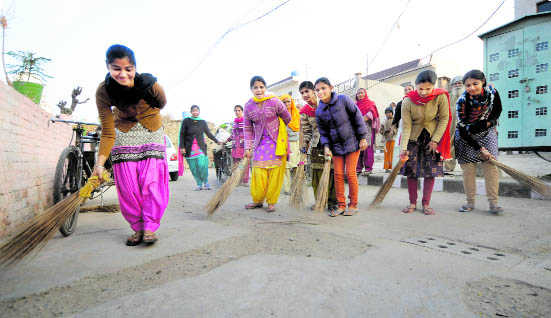
Each morning, Bahadurpur’s girls have a task cut out for them: Keep the village clean.
Prashant Saxena in Ropar
Live a village of your own: where a river soothes its forested periphery and rows of trees of every perceivable variety define its character; where there’s no next door to knock for a neighbour; and where even cows and buffaloes hoofing the farms and fields tell of a rhythm. There’s an unrefined, insatiable romance of life down a lane here and a few steps from there. Where happiness needs no index to measure, everything you wanted, it’s here: in Bahadurpur, about 50 km from Chandigarh, in Roopnagar nee Ropar.
There’s Dilbar Singh, standing amidst his cows being milked by machines. He hollers a boy and reminds him of lunch time, for the village. The boy quietly presses a button near a switchboard. And all of Bahadurpur, about 75 homes in all, is preparing lunch, its piped kitchen gas connected with the biogas plant rigged up by Dilbar. “I started it in 2012,”says Dilbar, as he tends his cows. “The supply is free, although winters are tough as methane needs to be kept at a particular temperature,” explains Dilbar. But how was he able to pull it off? “By not talking about money with my villager friends, with only one condition: the village will have to take care of its waste,”says Dilbar. “We all are stakeholders. If I have at least 75 cows that can produce cooking gas for the entire village, well, I am blessed,”says Dilbar.
The impact on the village is almost magical. “No one fights over the gas supply, no one complains about one’s contribution to the biogas plant,”says Prem Singh, village sarpanch. The three-hour, twice-daily supply is more than enough, and if you need more, just tell Dilbar or a plant worker.
Where does Dilbar manage to get money from? “We three brothers wanted to first set up a dairy. Then we realized the amount of bio waste it would generate. So we thought why not a dairy farm as well as a biogas plant which can supply free kitchen gas to each village household,”says Dilbar. After the plant got off the ground, the villagers realized they owed it to Bahadurpur to make it more liveable, more self-reliant.
“As a first step, we started paving the roads,”says the sarpanch. All drains were covered and storm water lines were created with regular gaps in the covering slabs. “We were given small encouragement from the state government. Besides, the sarpanch was invited to Delhi for a function presided over by the Prime Minister last summer for his efforts to make the village cleaner,”says a villager. Prem Singh has kept the picture as well as a small trophy that he received in Delhi well displayed in his house.
But who cleans up the lanes and the sole PWD damaged, narrow road leading to the village? “Sir, we all do it before we leave for our colleges,”chirp up girls almost in unison. “They carry jhadus, small containers to collect the trash, some used polythene bags and a ramshackle cart to ferry the junk and dispose it of into a pit, as directed by veer-ji (Dilbar). I am wheelchair bound, my duty is holler the girls in the morning to gather in front of my house and start work,”says Narinder Kaur. She is joined by Jaswant and Kamlesh Kaur who walk along with a dozen girls for a clean sweep.
“We need good quality brooms and trash bins, besides of course, a better vehicle to do our job,” says Rajvinder Kaur, a science graduate. Have they heard of Swachh Bharat? “What's that?” asks Manjit Kaur, into her second year of graduation in biotechnology. Nudged by Rajvinder, she says: “Ours must be the cleanest village. We are very proud of it. We want to do even better,”she says. Joined by Gurpreet, Amanpreet, Mandeep, Kanwal, Hardeep, Gurinder Simranjit and Puja, the village has turned a corner.
“We don't argue with anyone found littering. We go to him/her asking if he needs help to take care of the trash,”says Narinder Kaur. They all laugh.
Dilbar has come a long way since his graduation days. “I was the first first-division holder in pre-engineering in my village. I wanted to study further, but I told my friends that I would do something of my own. I had only a faint idea about what I would do. I repaired electronic equipment and sold junk. Then, this idea of doing something for the village struck me while we were planning to set up a farm here,” recalls Dilbar. “I found cows and buffaloes so useful.”
With his farm producing a good amount of milk, Dilbar has started his own confectionery. He is soon going to open a milk outlet in Chandigarh. His mithai is already being packed off for overseas markets in the US, UK, Canada and some Gulf countries. “If McDonald’s and KFC can come here, why can’t I reach there with my sweets?" chuckles he.
Wouldn’t you savour that?



























